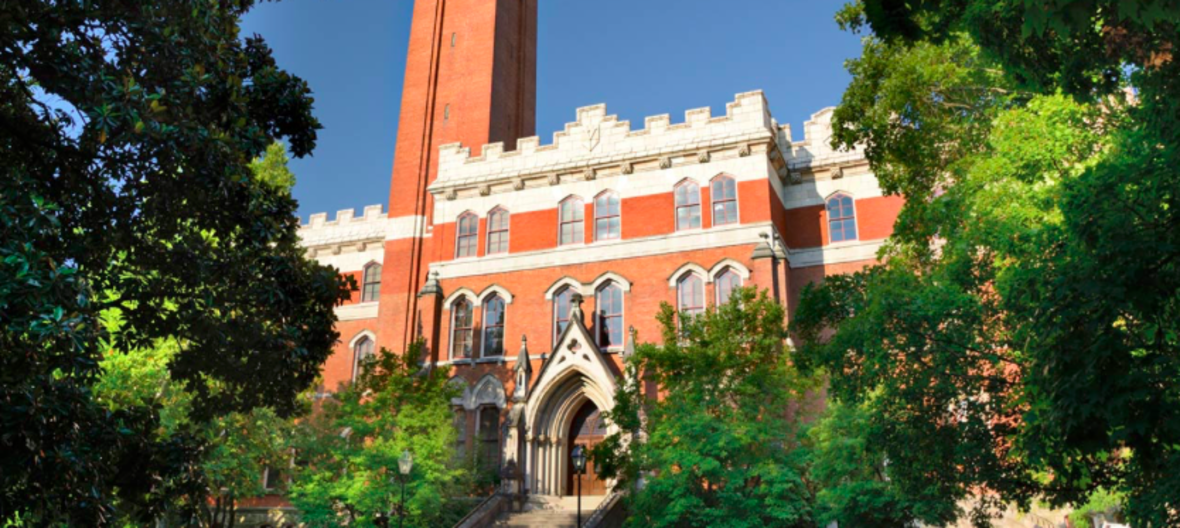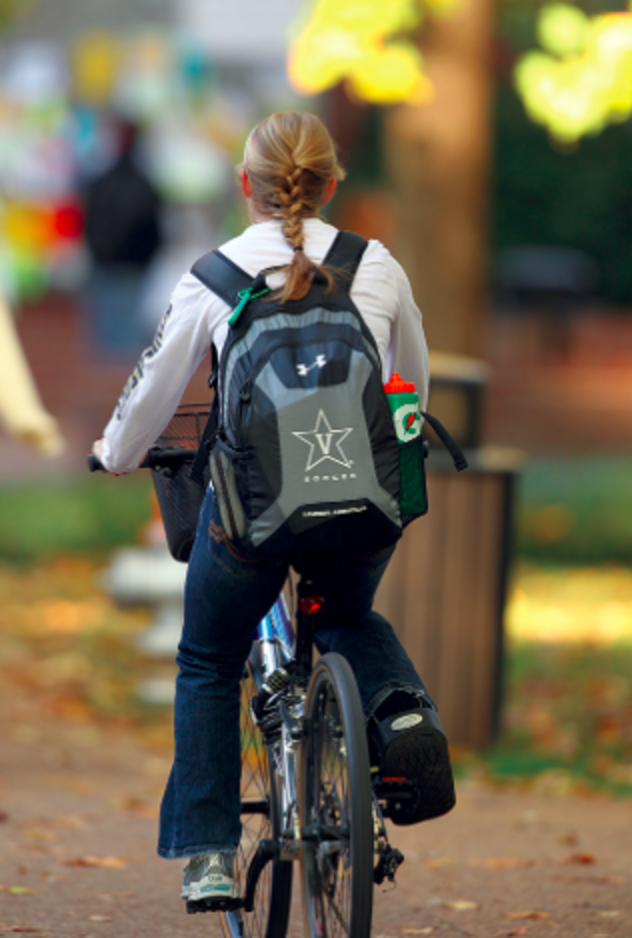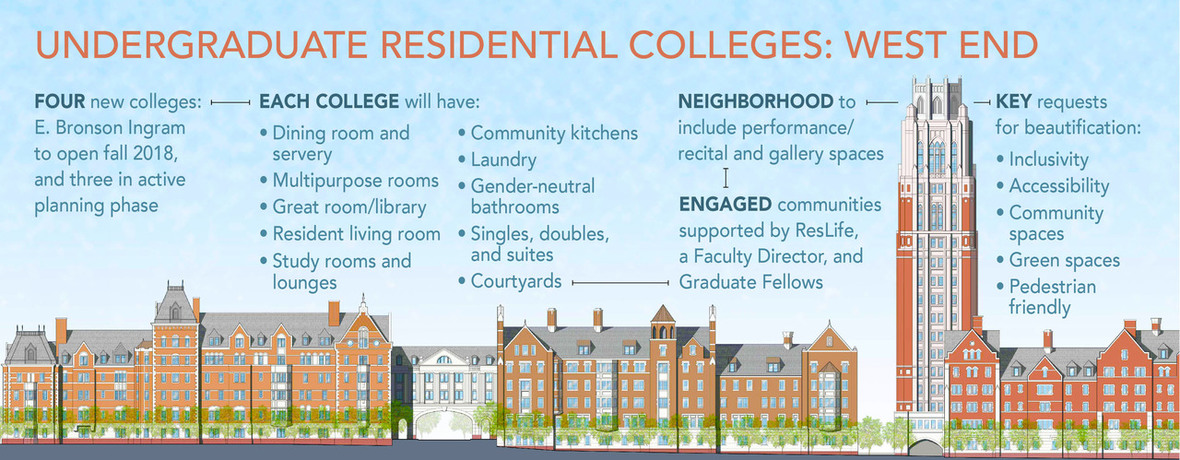Cumberland Region Tomorrow features Vanderbilt in Newsletter
Vanderbilt was featured in Cumberland Region Tomorrow’s recent newsletter. See what sustainable efforts they highlighted below.
What is FutureVU?
With Middle Tennessee facing a transit and growth crisis, CRT donor Vanderbilt University is taking a proactive approach with FutureVU, its bold 20-year land-use plan for its 333-acre campus in the heart of Nashville’s booming Midtown district.
“Much of our effort is aimed at educating the Vanderbilt community about the environmentally-friendly, traffic-friendly options we’re making available to reduce an unsustainable one-person, one-car culture,” said Eric Kopstain, vice chancellor of administration. “We’re a landlocked institution in the heart of Nashville. We are positioned to make a significant, positive impact on our students and the surrounding area by replacing acres of parking spaces with green spaces and academic buildings that better serve our mission.”
The plan includes long-term, campus-scale and neighborhood-scale transformative projects that endeavor to establish connections within the campus and extend into surrounding communities. To reduce its environmental impact on both Nashville and the region, FutureVU aims to preserve the historic campus and its unique and distinctive park setting while reinforcing and enhancing its walkability and sustainability.
All FutureVU efforts are guided by a core set of principles, created through an extensive Vanderbilt community engagement process. Read more about the principles here. FutureVU is a dynamic and evolving process. Learn more on the Future VU here.
MoveVU: A bold plan for change
As the university embarked on FutureVU, it became clear that a university-wide mobility or transportation demand management strategy would be essential to achieving the FutureVU vision. MoveVU, the university’s comprehensive mobility strategy, is an investment to improve bicycle and pedestrian infrastructure on-campus, a commitment to identify new ways to travel to and around Vanderbilt, and a key enabler of FutureVU.
“The development of MoveVU, Vanderbilt’s new mobility strategy, has been a unique collaboration with faculty administrators, staff and students.” Chancellor Nicholas S. Zeppos said. “MoveVU is about creating a plan to better move to and around our campus. We need to be inclusive and careful in our approach so that we are better stewards of our environment while meeting the mobility needs of those who live and work here at Vanderbilt.”
A goal to reduce single occupancy vehicle traffic by a third in just six years
Nearly 23,000 staff, faculty, students and visitors pass through Vanderbilt’s campus daily. Currently, 70 percent of those trips are made in a single occupancy vehicle. This traffic fights for space on roads, bike lanes, and sidewalks, not just on campus but throughout Nashville’s already clogged roadways. MoveVU aims to reduce the number of solo-driver trips its faculty, staff, and students make to just 47 percent (a reduction of about 5,000 daily trips) by 2025. This will allow the university to convert some of the $1.3 billion in prime Midtown land it currently devotes to parking to other uses that directly support its academic mission.
MoveVU received a major boost Nov. 6 when the Tennessee Department of Transportation awarded a $4.5 million, three-year CMAQ federal grant, which the university will match. The $9 million total will be used to fund MoveVU, a series of transit improvements in and around campus like shuttle operations, shuttle shelters, bike share shelters and other efforts to encourage greater use of sustainable travel options.
Vanderbilt’s Eight Distinct Neighborhoods
Vanderbilt’s history shows that campus grew as parcels of land were acquired. This created distinct neighborhoods on campus that are often different in architectural style, landscape and character.
The distinct campus neighborhoods, which include the Historic Core, West End, Highland, Peabody and more, are referenced throughout the FutureVU documents. FutureVU seeks to increase connectivity between the eight neighborhoods while seeking to bring a cohesiveness to the campus that does not exist today.
Connecting the Campus and Nashville
Weaving a web of connectivity between the campus neighborhoods and the fabric of Nashville is central to the FutureVU vision. Primary paths will focus on the pedestrian experience and provide a network for pedestrians and bicycles to traverse the campus.
The FutureVU vision introduced the concept of the Greenway, a connective network of paths and open spaces that define primary pedestrian circulation and connect the main public campus spaces along the way. After further exploring pedestrian movement, MoveVU has expanded the Greenway concept to include primary pathways throughout the Vanderbilt campus, as well as a “walk and roll” loop that will unify the campus edge. These primary pathways and loop will help create new campus gathering spaces and amenities as they serve as an accessible and unifying thread within the campus fabric.
New Residential Colleges Make Learning a 24-7 Experience
Vanderbilt’s largest-ever project is the construction of four new residential colleges between the Kirkland Hall Esplanade and 25th Avenue along West End Avenue. Included within this project are significant upgrades and beautification of nearby West Side Row and Greek Row. The next college will open in the fall of 2019 and the entire project will be completed by the university’s 150th anniversary in 2023.
“Residential colleges have been a mainstay at some universities, like Oxford and Cambridge, for centuries,” Chancellor Nicholas S. Zeppos said. “In a time when long-distance learning and online courses make getting a degree quicker and easier, Vanderbilt is choosing to invest deeply and broadly in an intensive, in-person experience.”
The new colleges are the next phase in the university’s residential college system, which launched in 2008 with the Martha Rivers Ingram Commons and includes the newest addition, E Bronson Ingram College, which opened this fall. Four-year residential college systems, where faculty mentors live alongside students and students build community and experience learning outside of the classroom, exist at only a handful of American universities, most notably at Harvard and Yale. Vanderbilt is the only American university undertaking a project of this scale and scope today.
Top Green College to go even greener
Named as one of the “Top 50 Green Colleges” by the Princeton Review in 2018, Vanderbilt aims to further reduce carbon emissions on campus with a focus on new sustainable energy practices.
Based on a combination of school-reported data and student opinion collected through surveys, Vanderbilt and the other schools on The Princeton Review list share “superb sustainability practices, a strong foundation in sustainability education, and a healthy quality of life for students on campus.” Vanderbilt was ranked 21st in the 2018 report.
Vanderbilt will continue to improve its sustainability with the BlueSky Energy Vision Study,which launched in January as part of FutureVU. The study will identify effective strategies for reducing carbon emissions and energy use on campus. Components of the study include local and off-site renewable energy generation, improved utility distribution, energy and water conservation, and improved operational efficiency. The study will culminate in a comprehensive “BlueSky Energy Vision” for campus energy in 2018.
Things to know
- Vanderbilt University receives $4.5M grant, will match to help fund MoveVU mobility plan
- Blue Sky Vision Committee is re-envisioning campus energy infrastructure, setting future sustainability targets.
- TDOT says 16 counties qualify for CMAQ grants, according to their Statewide Transportation Demand Management Plan (PDF)
- FutureVU involved more than 1,600 people to create the framework. Engagement process continues. (Read more)
- Nicholas S. Zeppos wants to keep Vanderbilt moving
- Vanderbilt greenhouse gas emissions drop 12 percent, new sustainability report shows
- Find more about FutureVU’s Neighborhood-specific Projects here
- SustainVU, managed by the Vanderbilt University Sustainability and Environmental Management Office (SEMO) showcases the wide variety of initiatives underway by students, staff and faculty groups.
- Vanderbilt ranked 21st among top ‘green’ colleges and universities by The Princeton Review








